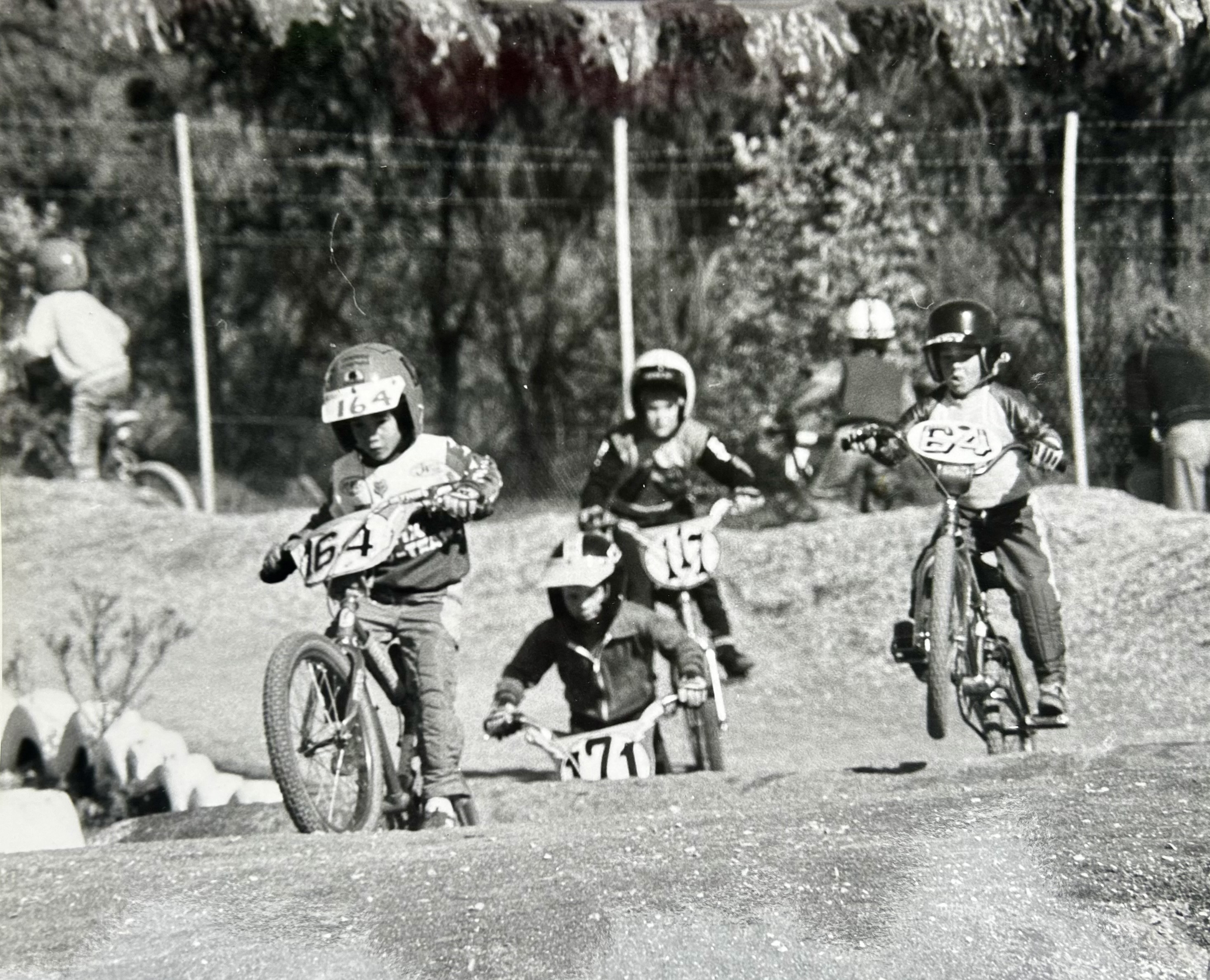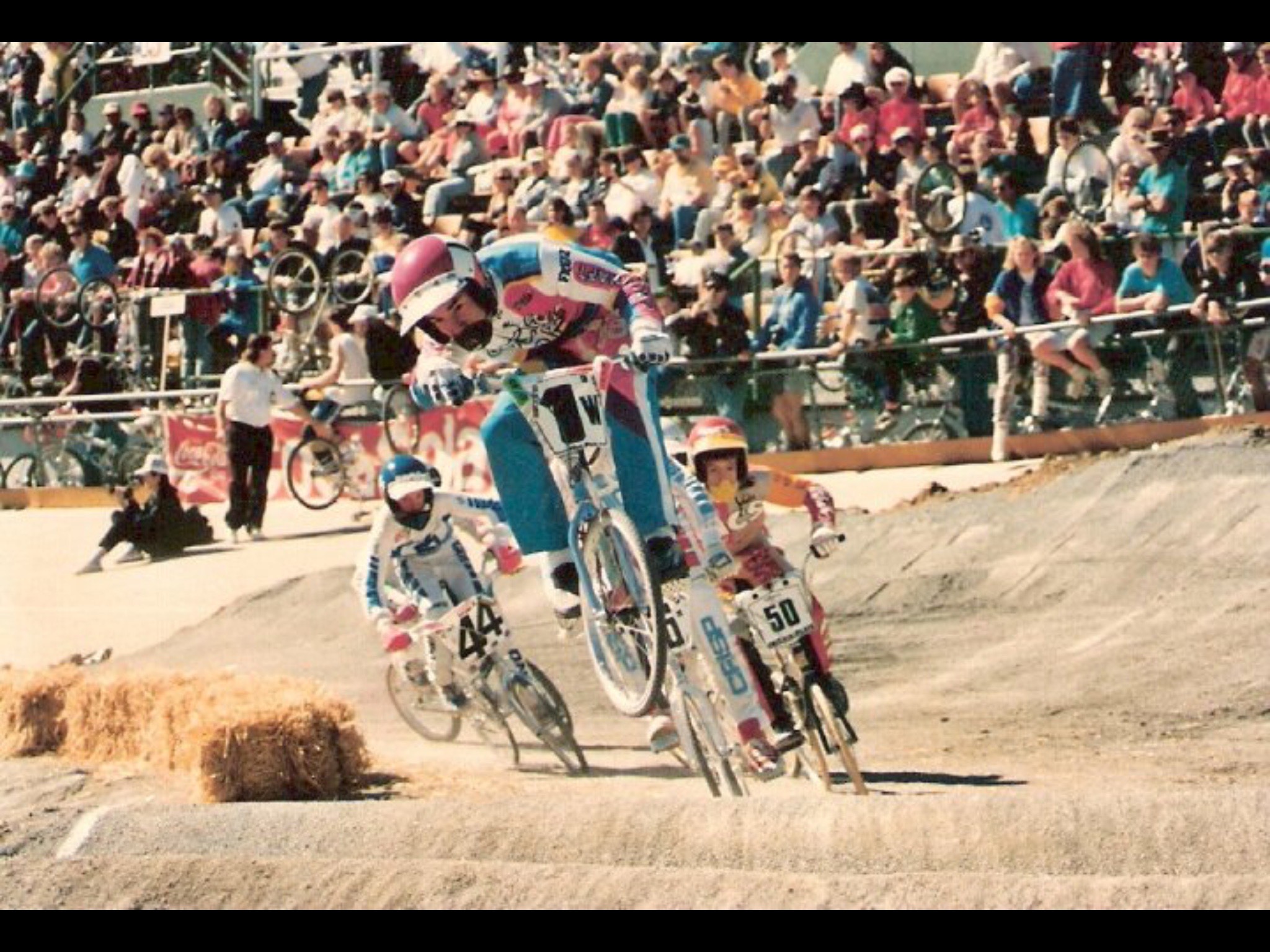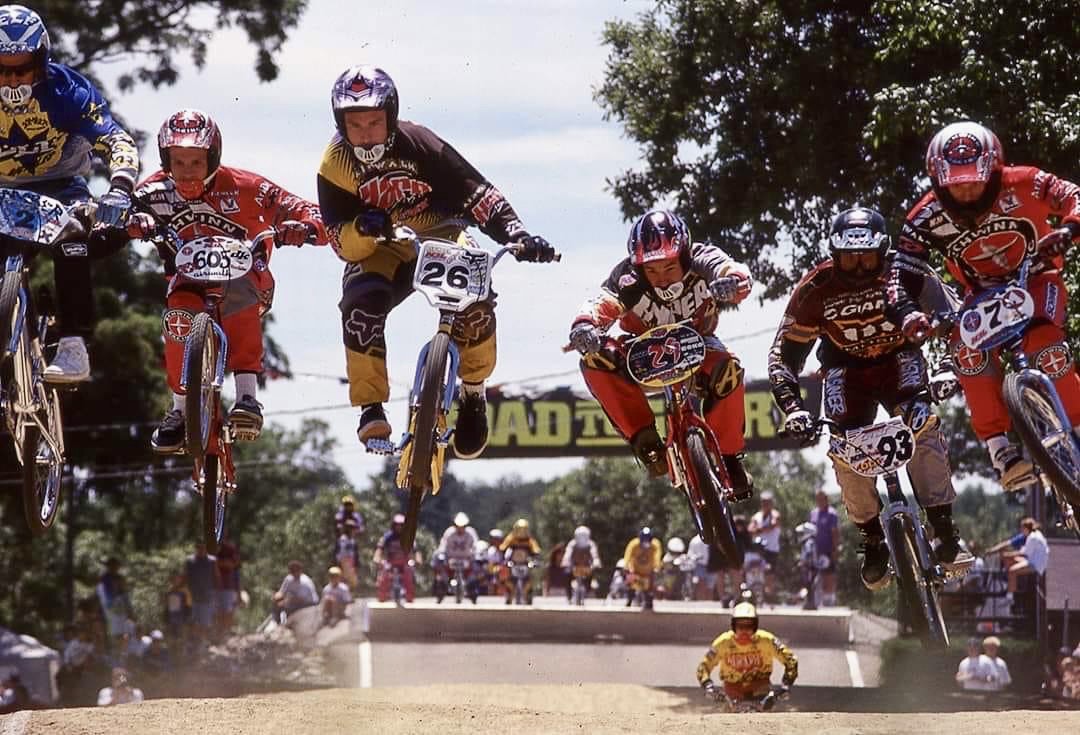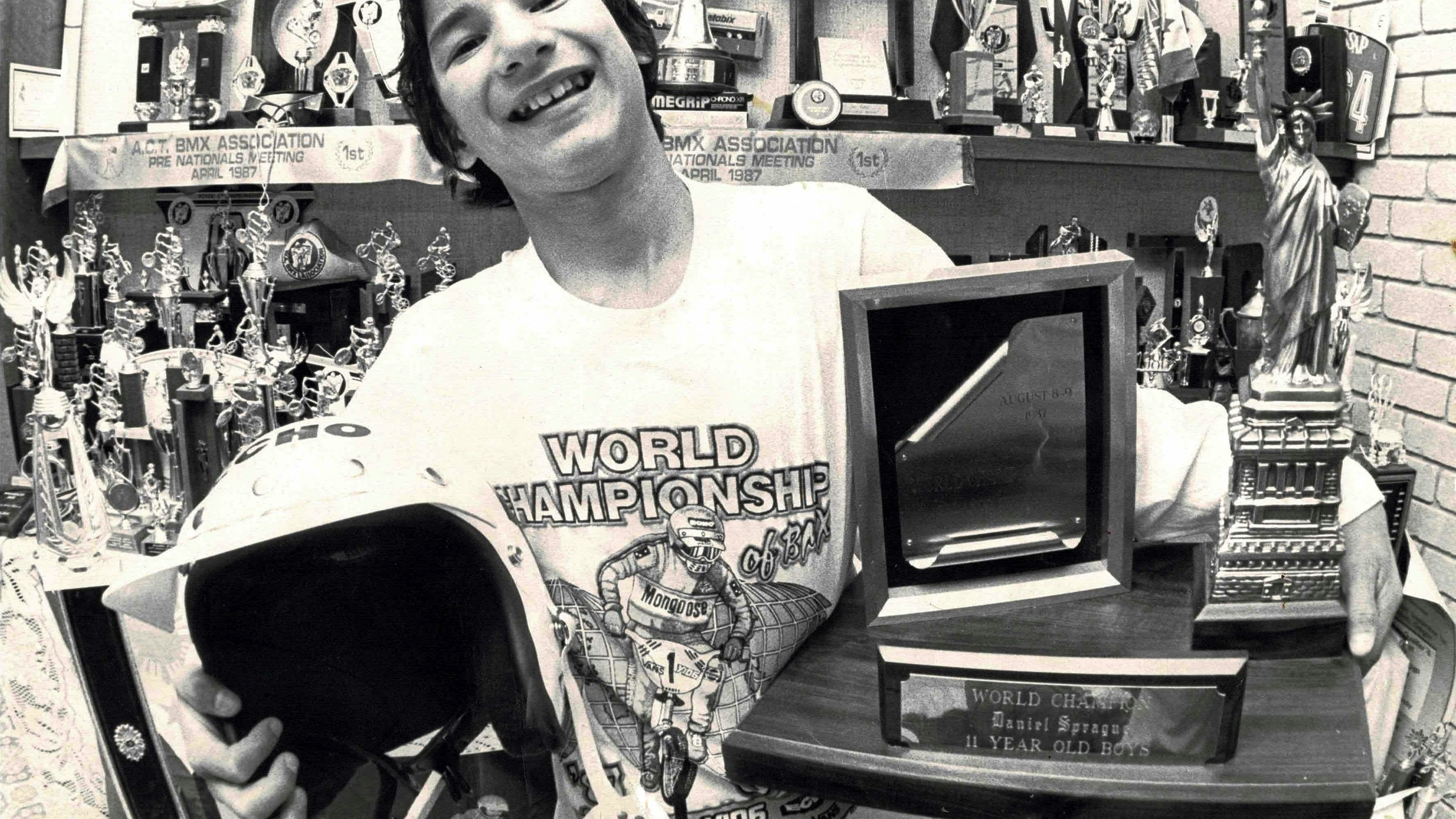The Australian BMX Hall of Fame will welcome its latest inductees at a gala function on the Gold Coast on later this month.
Ahead of the ceremony, AusCycling caught up with 2024 inductee Daniel Sprague, to chat about his illustrious BMX racing career and how he continues to give back to the next generation of riders.
Like many kids growing up in suburban Australia, Daniel Sprague received his first bike from Santa in 1981, when he was five years old. It was an Indy 500 BMX.
It was too big, and his feet couldn’t even touch the ground.
But the young Sprague loved that bike, and it was the bike that would unlock a lifelong passion for BMX racing.
As a seven-year-old, he created a track along his street in suburban Perth, where he would practice gates down the driveway, riding lap-after-lap of a circuit that included imaginary jumps.
It was this type of determination that launched Sprague into a junior career that included six national titles and two world championships.
Chasing his dream to become a professional BMX racer, Sprague relocated to the USA in the mid-90s where he spent four years touring and racing across the country against some of the biggest names in the sport.
For all the wins and achievements however, Sprague points to his final race on home soil as being one of his personal highlights.
It was the 2011 Western Australian Championships in Elite Men. Sprague was 36 and recalls there were doubters who thought he was too old to take the win.
“I just went through all the experiences and the processes that I had in my head. I just brought them all back for that weekend, and I was able to win that final,” Sprague recalls.
While he might be retired from racing now, his legacy and impact on the sport continues through his mentorship and coaching of young up and coming riders.
Read on for our chat with Sprague.

2023: Daniel Sprague with his my 1985 Diamond Back - the bike he used to win my first World Championship in 1987 and place second in 1986. Pictures supplied courtesy Daniel Sprague
You've been announced that you're inducted into the Hall of Fame, have you had time to reflect on it now and thought about, you know, what a what it means.
It's still a little bit of a pinch me moment because it was one of those things you kind of don't expect and when I got the call, I was like, ‘wow, that's amazing.’ To be honest, one of the things that I think, what I love about this and it's unfortunate I can't share it with my parents because they’ve passed away, but it was all due to my parents’ involvement and their help.
They were everywhere around the BMX tracks over here in WA. My dad was the president of the association. My mum, she was vice president and secretary. They ran Westside BMX club for years, and Wanneroo [BMX Club], and they were life members of both those clubs. So, from my point of view it was, to be awarded as a Hall of Fame inductee, I owe pretty much all of that to them.
Can you tell us how you got into racing.
One of the kids in the neighbourhood was going to the local track, which is Westside BMX Club, and he asked if I wanted to go along one day, so I was pretty excited. I was only a six-year-old kid. I went along with his family and my parents, and I sat on the gate because I was actually too scared to go down the ramp.

1982: A young Sprague, #164, within his first six months of racing at Westside BMX Club/
I sat on the gate for I'd say probably about 20 minutes, just watching all these kids go down. And then I went down, and as soon as I went down, that was it. I was hooked. I did one lap on the track, the biggest smile on my face, and I went that was it, ‘I want to do this.’ So, started racing at Westside in ‘82. It took like six months for me to win my first trophy, which I still have.
And to be honest, what it was, was that in BMX, you didn't need to look a certain way, you didn't need to act a certain way. It was a chance for you to kind of just be free as a kid, and hang out with your mates and ride.
It wasn't too long day before you started winning. You won two Junior World Championships. What would you say your strengths were as a rider?
I’m small, so I'm all about technique. You have to have power, and I grew up in the era of BMX where it was about long straights and powerful riders. But I was also moving through the 90s, and the late 80s, with the progression of the tracks where they started adding rhythm sections and more technical sections, and I was happy on those tracks because they were quite small and tight and as a result, they suited my riding style.

1989: World Championships - Brisbane
As a seven-year-old, I built this track in my head from my driveway, and I used to go down, out the driveway, do a gates down the driveway, down the road, turn around, go over some pretend jumps, over a pretend gate, all in my head, and I used to do that activity day in, day out. I'd probably do 60 or 70 laps before I go to for dinner in the in the evening. And as soon as I get up in the morning before breakfast, I’d go and ride that track. And that’s the determination that I didn't realise I needed to stay and keep doing what I did.
You moved to the USA in the early 90s to hit the BMX racing circuit over there, what precipitated that move?
When I was younger, my ambition was to be a professional BMX racer. And at that time, the only place you could really do that was to go to the US. You couldn't really make a living out of racing in Australia at the time. I won my first World Championship in Orlando, Florida. It was sort of the home of BMX at the time and to win there, it opened a lot of doors for me a bit. I got some sponsors from the US that were very loyal, and they at the time kept telling me, ‘you need to come to America. Even if it's not until you’re at the age where you can come and live here, you need to try to do it.’ And so, when I finally got to that age, that's pretty much what I did.

1997: Inside cover shot in US publication SNAP Magazine.
And what did you take away from the experience, the years you were there?
The main thing is that with BMX racing, because it's so short in duration, and back then there was no selection of lane pick, it was very random. So sometimes you would end up in the final and you’re on the outside. There's nothing you can do about it. One of the things you built is resilience as a result. So, when I came back, I was a much more resilient person. I knew that there's always another race if you don't do well at that particular one coming up in the future.

Daniel Sprague racing in the NBL All Pros (AA Pro) Final - Road to Glory Series. Picture: Supplied
I won a couple of world championships, but I finished as a finalist in I think 11 straight years of world championships. I was always in the top eight. But what the stats don't tell you is that I actually was leading probably about five or six world championship finals. I won only two.
One really big element that I took away from BMX, which I promote in all the coaching that I do now, is I ask riders and parents that are developing to never judge their riding based on their results. I always ask them to judge it on their performance. And their performance is how well they do a skill, how well they take a corner, how well they felt they went through the race. Those to me are more important elements to help you with your racing career than it is the result, because the results come if the performance is good.
Who would you say were your toughest competitors?
In that era, it would have been guys like Darryn Hill, there would have been Thomas Foreman, there would have been Darren Harry, there would have been Phil Beresford. There were guys like Julian Lim, Kamahl Lord, some of the Aussies that I grew up with. But then some of the pros, like getting on the gate with some of the pros, like Brett Scruse and that from the years gone by. They were incredible to race with. Jade McPherson, in the end, he became one of the guys that I raced with a lot here in WA in our older ages because a lot of those other guys weren't racing anymore, and Jade and I competed a lot, so I had a lot of respect for him as a competitor. In the US, it was probably guys like in In-Hee Lee, Corky Gainsford, Brian Foster, Neal Wood, Jamie Staff, Matt Pohlkamp, Randy Stumpfhauser. In the Pro class over there, there's so many tough guys. Gary Ellis is my all time, for me, the guy that I looked up to and I loved watching him race, and Eric Carter.
You mentioned coaching earlier. What enjoyment do you get out of coaching?

At first it was camaraderie. It was working with people that first were your friends as well as riders, and helping them.
Now, it literally is all about seeing the progression of these new guys coming through, and helping them learn some of the things that I can probably teach them to [help] with their progression.
One of the things that I love about working with some of these riders is watching them light up when they achieve something for the first time. Just to run them through a rhythm section and you know, they're trying to do some combination work, and they've never done it before. And then they achieve it, and you can literally see the wall that's in their mind just break into pieces. And that to me, that’s why I coach.
Have you got any personal BMX career highlights? When you think back, are there one or two events that stand out particularly in your mind?
Your first world championship victory is always going to stand out. That's a given. That's one of those events for me that in your mind always is there. That was winning in the US, in the homeland at the time of BMX.
Another achievement is when I decided I wanted to finish my BMX racing. I decided to compete at the West Australian Championships in Elite Men, and I was 36, and a lot of people thought, ‘oh, there's no way he's going to be able to win this. He’s done it, you know, the younger guys are going to probably be a bit quicker.’
And I just went through all the experiences and the processes that I had in my head. I just brought them all back for that weekend, and I was able to win that final. I knew that at that point in time, I'd achieved everything that I had set out to achieve in my career.

What do you think when you're watching contemporary BMX racing, and where do you think it will go in the next few years?
The level of both the male and the females have grown exponentially, but more so the female skill level has gone up. Their skill level is astronomical compared to years gone past. It's a credit to the training programs and the coaches and the tracks and all of that.
One of the things I would like to see is probably a bit more [of an] element on safety. I'm a bit concerned about some of the speeds the guys do nowadays, and I guess how hard the tracks are, so when they do come off, they're big falls. A lot of the racing that we did was in smaller stadiums over the years, so the speeds weren't as quick.
The national championships going to being in Westside BMX you home club this year, do you think you get down for a look if you get the chance?
Definitely. Yeah, I want to be there. I'm at Westside every Thursday night [laughs]. So, hopefully I should be able to get down there on the Friday, Saturday, Sunday. And look, I'm hoping a lot of the guys from around Australia get down to the track. The team has been doing a massive job getting it ready, and there's great support here in the community for the national championships to come to Perth and be at Westside.
The 2024 Bee NRG Australian BMX Hall Of Fame ceremony will take place on the Gold Coast, August 24 at the Mercure Gold Coast Resort. Tickets are sold out, but register here to join the wait list: https://events.humanitix.com/2024-australian-bmx-hall-of-fame-awards
The 2024 GWM BMX Racing National Championships
- Dates: 9-13 October
- Location: Westside BMX Club, Balcatta
- More information: 2024 GWM BMX Racing National Championships
The 2024 GWM BMX Racing National Championships are proudly supported by GWM Australia & New Zealand, the City of Stirling, and the Western Australian Government through Tourism WA, the Department of Local Government, Sport and Cultural Industries, and Lotterywest.
